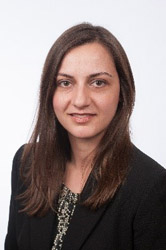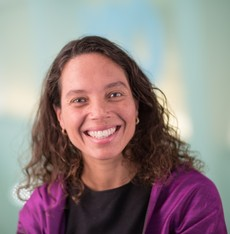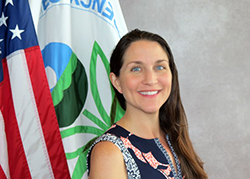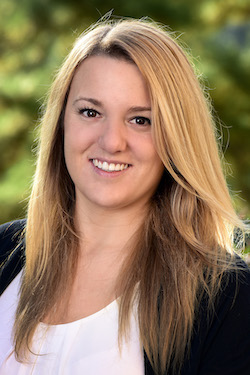Exposures and Latent Disease Risk: Session III - Arsenic as a Case Study
Sponsored by: NIEHS Superfund Research Program
Archived: Monday, June 8, 2020
Exposures and Latent Disease Risk: Session III - Arsenic as a Case Study
2020-06-08
NIEHS Superfund Research Program
The NIEHS Superfund Research Program (SRP) is hosting a Risk e-Learning webinar series focused on understanding the health effects of exposures when there is a lag between exposure and the onset of the disease.
In the third session, presenters will describe studies linking early-life arsenic exposure and later-life disease risk. The focus on arsenic as a case study may also provide insights into linking other exposures to latent disease risk and identifying windows of susceptibility.
Yu Chen, Ph.D., and Maria Argos, Ph.D., co-investigators of a project with the Columbia University SRP Center, will present research from the Health Effects of Arsenic Longitudinal Study (HEALS) and ancillary studies linking early-life arsenic exposure and disease risk across the life course. For nearly two decades, HEALS has provided individual-level epidemiologic data evaluating risks from chronic arsenic exposure through drinking water in rural Bangladesh with clinical and molecular endpoints.
Fenna Sillé, Ph.D., assistant professor at the Johns Hopkins University Bloomberg School of Public Health, will discuss her research focused on early-life exposures to arsenic and immune system changes. As an alumna of the University of California, Berkeley SRP Center, she will also discuss studies assessing the long-term effects of a unique early-life arsenic exposure situation in Northern Chile. She will present data from in vitro and in vivo models as well as from the Chilean population study.
Erik Tokar, Ph.D., leader of the NIEHS National Toxicology Program Stem Cell Toxicology Group, will discuss the association between early-life arsenic exposure and cancer in adulthood. His presentation will focus on cancer formation in adulthood following in utero and "whole life" exposure to arsenic. It will cover in vivo and in vitro models and discuss the effects of arsenic on stem cell recruitment and the microenvironment during transformation and cancer stem cell formation.
Accessibility, Recording, and Content Disclaimer
Rehabilitation Act Notice for Reasonable Accommodation
It is EPA's policy to make reasonable accommodation to persons with disabilities wishing to participate in the agency's programs and activities, pursuant to the Rehabilitation Act of 1973, 29 U.S.C. 791. Any request for accommodation should be made to Sara Amolegbe at 919-213-4906 or sara.amolegbe@nih.gov, preferably one week or more in advance of the webinar, so that EPA will have sufficient time to process the request. EPA would welcome specific recommendations from requestors specifying the nature or type of accommodation needed. Please note that CLU-IN provides both alternate phone call-in options and closed captioning for all webinars, and requests for these specific accommodations are not necessary.
Webinar Recording
By participating in this CLU-IN webinar, you automatically agree to authorize recording of audio and visual content presented during this live event and consent to subsequent use of this recording in the public domain by the U.S. Environmental Protection Agency. This recording may include questions, comments and poll responses provided by you during the live event in addition to your name, voice, image or likeness. This recording will be made available after the conclusion of the live event as part of the CLU-IN webinar archives, and will remain available indefinitely. If you do not wish to consent to the recording, please do not join the live event, and contact Jean Balent at 202-566-0832 or balent.jean@epa.gov to discuss your concerns.
Content Disclaimer
This webinar is intended solely to provide information to the public. The views and opinions expressed as part of this webinar do not necessarily state or reflect those of the U.S. Environmental Protection Agency. It is not intended, nor can it be relied upon, to create any rights enforceable by any party in litigation with the United States, or to endorse the use of products or services provided by specific vendors. With respect to this webinar, neither the United States Government nor any of their employees, makes any warranty, express or implied, including the warranties of merchantability and fitness for a particular purpose, or assumes any legal liability or responsibility for the accuracy, completeness, or usefulness of any information, apparatus, product, or process disclosed, or represents that its use would not infringe privately owned rights.
Presenters:
 Yu Chen, Ph.D., New York University, Columbia University SRP Center (Yu.Chen@nyulangone.org or 212-263-4839)
Yu Chen, Ph.D., New York University, Columbia University SRP Center (Yu.Chen@nyulangone.org or 212-263-4839)
Yu Chen, Ph.D., is a professor at New York University (NYU) in the Department of Population Health and the Department of Environmental Medicine. She is a chronic disease epidemiologist involved in multidisciplinary research that focuses on how host and environmental factors are related to chronic diseases, including cardiovascular disease and cancer. For nearly two decades, she has worked with colleagues from Columbia University and the University of Chicago to study health effects of arsenic exposure in the Health Effects of Arsenic Longitudinal Study (HEALS) in Bangladesh. She leads another project with colleagues at Vanderbilt University to investigate the role of the gastric and oral microbiome in gastric premalignant and malignant lesions. She also conducts research using resources from the NYU Women's Health Study and the Asia Cohort Consortium. Chen is a recipient of the Outstanding New Environmental Scientist Award from NIEHS. She directs a course on epidemiology methods for graduate students at NYU School of Medicine. She received her Ph.D. with distinction in epidemiology from Columbia University in 2005.
 Maria Argos, Ph.D., University of Chicago, Columbia University SRP Center (argos@uic.edu or 312-355-1584)
Maria Argos, Ph.D., University of Chicago, Columbia University SRP Center (argos@uic.edu or 312-355-1584)
Maria Argos, Ph.D., is an associate professor of epidemiology at the University of Illinois at Chicago School of Public Health. Her research focuses on the environmental and molecular epidemiology of chronic diseases, with particular emphasis on the health effects of metal exposures. Her research also has a strong focus on identifying molecular pathways altered by environmental exposures that influence disease risk by leveraging high-dimensional molecular data and biomarker data obtained from biological specimens collected in the epidemiological setting. She is the principal investigator of the Bangladesh Environmental Research in Children's Health (BIRCH) cohort that aims to evaluate early life health effects of arsenic exposure and metal mixtures. She is also a co-investigator of the Health Effects of Arsenic Longitudinal Study (HEALS) and the Columbia University SRP Center. She holds an M.P.H. degree in Environmental Health Sciences and a Ph.D. degree in Epidemiology from Columbia University.
 Fenna Sillé, Ph.D., Johns Hopkins University (fsille1@jhu.edu or 410-502-4556)
Fenna Sillé, Ph.D., Johns Hopkins University (fsille1@jhu.edu or 410-502-4556)
Fenna Sillé, Ph.D., is an assistant professor at the Johns Hopkins University Bloomberg School of Public Health. She is researching how early-life exposures change the immune system and increase the risk of respiratory infections and lung cancer later in life. Her lab currently focuses on the effect of arsenic exposure on tuberculosis, influenza, and vaccine efficacy. Prior to joining Johns Hopkins, Sillé was a postdoctoral fellow at UC Berkeley. As an alumna of the UC Berkeley SRP Center, she collaborates with Craig Steinmaus, M.D., and Martyn Smith, Ph.D., as well as Catterina Ferreccio, M.D., MPH (Pontificia Universidad Católica de Chile) on studies assessing the long-term effects of a unique early-life arsenic exposure situation in Northern Chile. She is a recipient of numerous awards, including the prestigious K99/R00 Career Development Grant from NIEHS.
 Erik Tokar, Ph.D., National Institute of Environmental Health Sciences (erik.tokar@nih.gov or 984-287-4173)
Erik Tokar, Ph.D., National Institute of Environmental Health Sciences (erik.tokar@nih.gov or 984-287-4173)
Erik Tokar, Ph.D., leads the Stem Cell Toxicology Group in the National Toxicology Program Laboratory (NTPL) branch of the NTP at NIEHS. He received his Ph.D. in Cancer Biology from Michigan State University and did his postdoctoral fellowship at the National Cancer Institute at NIEHS. His research has focused on stem cells and cancer stem cells in inorganic carcinogenesis, and more recently on pluripotent stem cells in developmental toxicology. He has authored/co-authored over 70 publications, serves as Associate Editor for Environmental Health Perspectives, Toxicology and Applied Pharmacology, and Toxicological Sciences, and has served on multiple NTP, US EPA, and WHO (IARC) review and science advisory panels. He is an active member of the Society of Toxicology and its NC SOT regional chapter, the International Society for Stem Cell Research, and the American Association of Cancer Research.
Moderators:
 Jean Balent, U.S. EPA Technology Innovation and Field Services Division (balent.jean@epa.gov or 202-566-0832)
Jean Balent, U.S. EPA Technology Innovation and Field Services Division (balent.jean@epa.gov or 202-566-0832)
Ms Balent is on the staff of the EPA's Technology Innovation and Field Services Division where she has worked to collect and disseminate hazardous waste remediation and characterization information since 2003. Ms Balent manages the Clean Up Information Network website and actively supports online communication and collaboration resources available to EPA. She formerly worked with the US Army Corps of Engineers Environmental Engineering Division in the Buffalo District. Ms Balent was also a member of the SUNY-Buffalo Groundwater Research Group where she constructed and tested large scale models of groundwater flow. Ms Balent has also conducted research relating to the Great Lakes, environmental remediation, and brownfields re-development. She holds a Bachelor's degree in environmental engineering from SUNY-Buffalo and a Master's degree in Information Technology from AIU.
 Brittany A. Trottier, Health Specialist, Superfund Research Program, National Institute of Environmental Health Sciences (brittany.trottier@nih.gov)
Brittany A. Trottier, Health Specialist, Superfund Research Program, National Institute of Environmental Health Sciences (brittany.trottier@nih.gov)
Brittany Trottier, M.P.H., is a Health Specialist with the Superfund Research Program (SRP). She provides program analysis and support of SRP activities, supports communication of SRP grantees’ scientific accomplishments, and serves as the lead for SRP community engagement activities. She also oversees the Conference Grant portfolio for SRP and serves as the Program Manager for the KC Donnelly Externship Award Supplement to promote translational and transdisciplinary efforts in graduate and post-doctoral for SRP trainees. She received her Master’s in Public Health from the Milken Institute School of Public Health of The George Washington University in 2017 and has a Bachelor of Arts in Chemistry from Adrian College.
Webinar Slides and References:
Webinar Slides and References:
-
 Slide Presentation for Yu Chen, Ph.D., and Maria Argos, Ph.D., Columbia University SRP Center (1.74MB/PDF)
Slide Presentation for Yu Chen, Ph.D., and Maria Argos, Ph.D., Columbia University SRP Center (1.74MB/PDF)
-
 Slide Presentation for Fenna Sille, Ph.D., Johns Hopkins University (1.47MB/PDF)
Slide Presentation for Fenna Sille, Ph.D., Johns Hopkins University (1.47MB/PDF)
-
 Slide Presentation for Erik Tokar, Ph.D., NIEHS (3.57MB/PDF)
Slide Presentation for Erik Tokar, Ph.D., NIEHS (3.57MB/PDF)
Additional Resources:
- Associations Between Prenatal Arsenic Exposure with Adverse Pregnancy Outcome and Child Mortality
- Association of Arsenic Exposure with Whole Blood DNA Methylation: An Epigenome-Wide Study of Bangladeshi Adults
- Association Between Arsenic Exposure from Drinking Water and Longitudinal Change in Blood Pressure Among HEALS Cohort Participants
- Increased Lung and Bladder Cancer Incidence in Adults After In Utero and Early-Life Arsenic Exposure
- Age at Exposure to Arsenic in Water and Mortality 30-40 Years After Exposure Cessation
- Environmental Exposures During Pregnancy: Mechanistic Effects on Immunity
- Arsenic Exposure Transforms Human Epithelial Stem/Progenitor Cells into a Cancer Stem-like Phenotype
- Carcinogenic Effects of "Whole-Life" Exposure to Inorganic Arsenic in CD1 Mice
- Arsenic Alters Exosome Quantity and Cargo to Mediate Stem Cell Recruitment Into a Cancer Stem Cell-Like Phenotype
If you have a suggested topic or idea for a future CLU-IN internet seminar, please contact:
Technology Integration and Information Branch
PH: 202-566-0832 | Email: balent.jean@epa.gov
Technology Integration and Information Branch
PH: 202-566-0875 | Email: adam.michael@epa.gov





